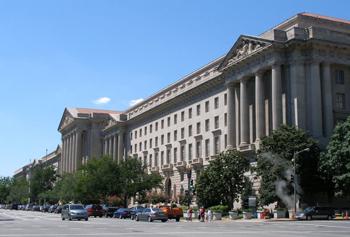Environmental Protection Agency has rough 2011, shows uneven progress
EPA headquarters in Washington, D.C. (Photo by Coolcaesar via Wikimedia Commons.)
It was a tough year for the Environmental Protection Agency — then again what’s new?
Environmentalists celebrated when the EPA raised concerns about the environmental impact of the Keystone XL pipeline. President Barack Obama asked for more studies on the pipeline, delaying it’s implementation to 2013.
On the other hand, people were furious when Obama directed the EPA to re-examine its proposed guidelines for reducing smog.
But one measure that got little publicity was a requirement that car manufacturers raise the fuel milage of their new vehicles to an average of 54.5 miles per gallon by 2020, said Politco reporter Erica Martinson.
“They’ve done a lot to encourage some trucks that have better fuel economy – that’s something quite new. But, I think that it seemed to sort of slide by in the national eye,” she said.
Another major issue that will carry over into next year is the question of fracking. Not long ago, the EPA ruled that fracking could be damaging drinking water in Wyoming. Now, they’re being asked to implement rules on the disposal of fracking fluid. Plus, they’ll have to green-light fracking in the Marcellus Shale, which would be a big boon for the domestic natural gas industry.
“(It) changes the game a lot for EPA, in the way they decide to do certain air emissions rules,” Martinson said. “The price of natural gas has gone down so dramatically that it opens it up for a lot more options for regulating utilities and power plants.”
And last week they released new regulations on mercury emissions from power plants. Mercury regulations have an odd mix of political support, including from evangelical Christians, which may make it easier to implement, even while the Republicans continues to beat up on the EPA.
Many opponents in Congress are saying the new mercury rules will cause reliability problems for the American electric system.
“It’s one of the bigger rules they’ve ever done,” Martinson said. “It’s going to cover a lot of coal-fired power plants, which means all the older coal-fired power plants that are 30, 40, 50 years old that haven’t been as tightly regulated in the past, at lot of them will shut down.”
The House have been fiercely critical of the EPA this session. Many of their jobs bills have aimed at reducing the regulatory power of the EPA, or rolling back rules that have already been put in place.
“I expect that we’ll see a lot more of this ‘jobs vs. environment’ coming up in the next year,” she said.
